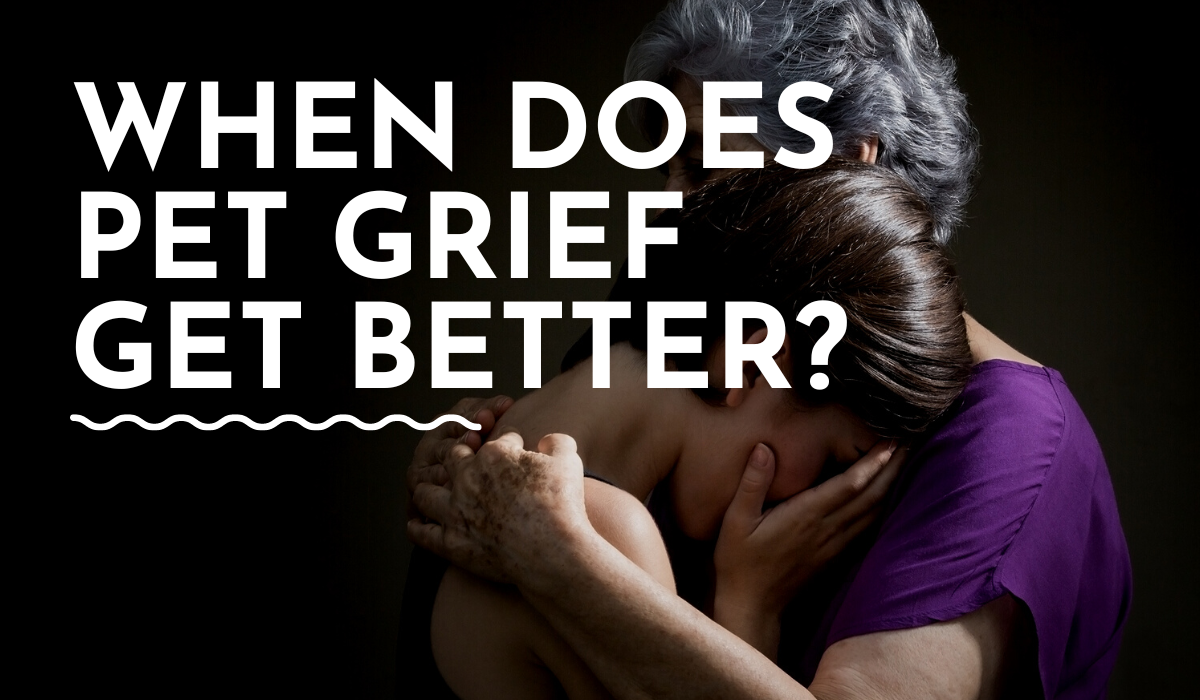Coping with the loss of a pet is a unique experience that can be challenging to navigate, and many people wonder when they will start to feel better.
The truth is, there is no set timeline for pet grief.
The grieving process is different for everyone, and it can take weeks, months, or even years to come to terms with the loss of a beloved pet.
However, while the grieving process can be difficult to navigate, there are ways to make yourself feel better and resources available to help.
Therefore, in this article, we will discuss how long pet grief usually lasts and how you can cope with it better.

Understanding Pet Grief
Pet grief is the emotional pain and suffering experienced by pet owners after the loss of their beloved pets.
This experience can be just as intense as the grief experienced after losing a human loved one; therefore, for many people, it’s one of the most, if not the most, challenging things to ever go through in life.
The grieving process can also be complicated by feelings of guilt, anger, anxiety, and even severe depression, especially if the pet owner feels they could have done more to prevent their pet’s death.
Surviving pets may also experience grief and confusion after the loss of their companion.
Therefore, pet grief can be a serious process that should not be treated lightly by the pet owner or those around them.
Coping with Pet Grief
The grieving process is different for everyone, and there is no right or wrong way to grieve.
Pet owners may find comfort in talking to family members or joining a pet loss support group.
Therapy can also be helpful for those experiencing intense emotional pain or depression.
It is important for pet owners to be compassionate with themselves and allow themselves time to grieve.
Creating a legacy for their pet, such as a memorial or photo album, can also help with the healing process.
It may take time, but with support and self-care, pet owners can eventually reach a place of acceptance and find joy in the memories of their beloved pet.
When Does Pet Grief Get Better?
The timeline for healing after losing a pet is highly individual and can vary significantly from person to person.
Some may begin to feel a sense of normalcy within a few weeks, while for others, the grieving process can take months or even years.
Several factors can influence the healing process:
The Depth of Your Bond: The stronger your bond with your pet, the more profound your grief may be. Pets that have been with you for a long time or those that provided significant emotional support can leave a larger void, making the grieving process longer and more intense.
Your Support System: Having a solid support system can significantly impact the healing timeline. Friends, family, and support groups who understand the significance of your loss can provide comfort and help you process your emotions more effectively.
Previous Experiences with Loss: If you’ve experienced significant losses before, you may find that your grief for your pet is compounded by previous grief. Conversely, navigating past losses might also equip you with coping strategies to aid your healing.
Personal Coping Mechanisms: Everyone has different ways of coping with grief. Some may find comfort in routine, while others might need a break from their daily activities to process their emotions. Engaging in self-care, creative expression, and seeking professional help can all affect how quickly or slowly you move through your grief.
Circumstances of the Loss: The circumstances surrounding your pet’s death can also affect your grieving process. A sudden or traumatic loss may result in a more intense and prolonged grieving period compared to a loss that you had time to prepare for.
Ultimately, there’s no set timeline for when pet grief will get better.
When grieving a departed pet, it’s important to remember that healing is a gradual process, and it’s okay to take the time you need to honor and remember your beloved pet.
10 Ways to Cope with Pet Loss Grief

1. Acknowledge your feelings: It’s okay to feel sad, angry, or guilty after losing a pet. Acknowledge your emotions and allow yourself to feel them.
2. Take care of yourself: Grief can take a toll on your physical and emotional health. Take care of yourself by eating well, getting enough sleep, and engaging in self-care activities.
3. Talk to someone: Talking to a friend, family member, or therapist about your feelings can help you process your grief and find support.
4. Create a memorial: Creating a memorial for your pet can help you honor their memory and cope with their loss. Consider making a scrapbook, planting a tree, or making a donation in their name.
5. Engage in Creative Expression: Use creative outlets such as writing, painting, or crafting to express your emotions related to the loss of your pet.
6. Join a support group: Sometimes, connecting with others who have experienced similar losses can provide comfort and understanding. Consider joining a pet loss support group, either in person or online, to share your feelings and gain insight from others who are also coping with the loss of a beloved pet.
7. Establish a Routine: The loss of a pet can disrupt your daily routine. Establishing a new routine can help provide structure and a sense of normalcy. Focus on activities that bring you comfort and joy, whether walking in the park, engaging in a hobby, or spending time with loved ones.
8. Seek therapy: If you’re struggling to cope with pet grief, therapy can be a helpful resource. A therapist can provide a non-judgmental space for you to process your feelings and develop coping strategies. They can also help you work through feelings of guilt, depression, and anxiety that may arise after losing a pet.
9. Celebrate Their Life: Host a small gathering with close friends and family to celebrate your pet’s life. Share stories, photos, and memories that highlight the joy and love they brought into your life. This communal remembrance can provide comfort and reinforce the positive impact your pet had.
10. Adopt or Foster Another Pet: When you feel ready, consider adopting or fostering another pet. While a new pet will never replace the one you’ve lost, offering your love and care to another animal in need can be a healing and rewarding experience.
Honor Your Pet’s Legacy
Honoring and remembering a pet’s legacy can offer solace and keep their memory alive.
Here are some meaningful ways to cherish the legacy of a beloved pet:
Create a Memory Book: Compile photos, stories, and mementos in a scrapbook or digital album to capture your pet’s life and the joy they brought into your home. This can be a therapeutic activity that helps you reflect on the happy moments.
Custom Jewelry: Consider having a piece of custom jewelry made, such as a pendant or bracelet, that includes your pet’s name, paw print, or a small portion of their ashes. This keeps them close to your heart.
Personalized Artwork: Commission or create a piece of art that captures your pet’s unique personality. Whether it’s a painting, sculpture, or digital illustration, having a visual tribute can be a comforting reminder.
Volunteer or Donate: Honor your pet’s legacy by helping other animals. Volunteer at a local shelter or make a donation in your pet’s name to an animal charity. This act of kindness can be a meaningful way to give back and keep your pet’s spirit alive.
Plant a Tree or Garden: Plant a tree, shrub, or flower garden in your pet’s favorite spot in the yard. Watching it grow and flourish can serve as a memorial that symbolizes your pet’s lasting impact on your life.
Write a Tribute: Pen a heartfelt tribute or letter to your pet, expressing your love and memories. You can share it online, with family and friends, or keep it in a special place. Writing can be a powerful way to process your feelings and celebrate your pet’s unique legacy.
Incorporating these practices into your life can help you find peace and continue to honor the special bond you shared with your pet.
Grief is a natural response to the loss of a pet, and healing takes time.
It’s important to respect your grieving process by engaging in activities that guide you through this difficult period.
Seeking professional help or leaning on friends and family can be invaluable support.
Establishing healthy self-care routines, finding a hobby, expressing your grief through creative outlets, and maintaining good eating and sleeping habits are crucial steps in coping with the loss.